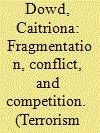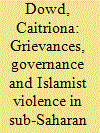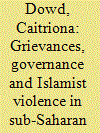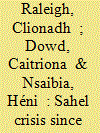|
|
|
Sort Order |
|
|
|
Items / Page
|
|
|
|
|
|
|
| Srl | Item |
| 1 |
ID:
181832


|
|
|
|
|
| Summary/Abstract |
For decades, Plateau State in Nigeria's Middle Belt has witnessed repeated ethnoreligious violence. Over this period, both state and federal governments have established formal Commissions of Inquiry (COIs) in response to unrest, tasked with investigating violence, identifying perpetrators, and – ultimately – strengthening accountability. While commissions’ mandates and specific outcomes varied, there is general consensus that inquiries have been largely ineffective at securing justice or establishing accountability for violence. This study seeks to understand the expectations placed on, and role of, COIs in Plateau State as pathways to formal accountability in a context of recurring violence. We argue that COIs are embedded in the complex, multilevel networks and politics of state and non-state institutions. Civil society, in turn, has diverse expectations and demands, and articulates these in fragmented ways. As a result, COIs served primarily as another avenue for interest-based negotiations.
|
|
|
|
|
|
|
|
|
|
|
|
|
|
|
|
| 2 |
ID:
166669


|
|
|
|
|
| Summary/Abstract |
In spite of the shared high profile of recent Islamist attacks on civilians in sub-Saharan Africa, patterns of anti-civilian violence differ across and within violent Islamist groups, and the countries in which they are active. This research seeks to explain this variation by situating Islamist violence within the sub-national spaces in which such groups operate, and the wider conflict environment in which they choose to use, or limit the use of, anti-civilian violence. Drawing on data from the Armed Conflict Location & Event Dataset, the research finds that violent Islamist groups are more likely to target civilians where they are the most active conflict agent, even when other conflict agents are active in the same spaces; but less likely to do so when they are relatively weak and in competition with other non-state armed groups. Anti-civilian violence is thus deployed strategically by violent Islamist groups, while its function as a signalling or retributive policing tool depends on the relative strength of groups in relation to actors in the wider conflict arena.
|
|
|
|
|
|
|
|
|
|
|
|
|
|
|
|
| 3 |
ID:
146122


|
|
|
|
|
| Summary/Abstract |
What explains the emergence of Islamist violence as a substantial security threat in such diverse contexts as Kenya, Mali and Nigeria? This article addresses this question through an exploration of the strategies of governance employed by states, and how these shape the emergence and mode of collective violence. Conflict research often emphasises the specificity of Islamist violence; but these conflicts can be understood as a form of political exclusion and grievance-based violence, comparable to other forms of political violence. Further, violent Islamist groups emerge from local conditions: the areas in which groups are established share similar local experiences of governance and political marginalisation; a history of violent conflict on which Islamist militants capitalise; and key triggering events expanding or reinforcing state exclusion. These findings challenge a narrative emphasising the global, interconnected nature of Islamist violence. This article pairs data from the Armed Conflict Location & Event Dataset (ACLED) with Afrobarometer survey data and case study evidence to identify drivers of Islamist violence across three African countries.
|
|
|
|
|
|
|
|
|
|
|
|
|
|
|
|
| 4 |
ID:
156765


|
|
|
|
|
| Summary/Abstract |
What explains the emergence of Islamist violence as a substantial security threat in such diverse contexts as Kenya, Mali and Nigeria? This article addresses this question through an exploration of the strategies of governance employed by states, and how these shape the emergence and mode of collective violence. Conflict research often emphasises the specificity of Islamist violence; but these conflicts can be understood as a form of political exclusion and grievance-based violence, comparable to other forms of political violence. Further, violent Islamist groups emerge from local conditions: the areas in which groups are established share similar local experiences of governance and political marginalisation; a history of violent conflict on which Islamist militants capitalise; and key triggering events expanding or reinforcing state exclusion. These findings challenge a narrative emphasising the global, interconnected nature of Islamist violence. This article pairs data from the Armed Conflict Location & Event Dataset (ACLED) with Afrobarometer survey data and case study evidence to identify drivers of Islamist violence across three African countries.
|
|
|
|
|
|
|
|
|
|
|
|
|
|
|
|
| 5 |
ID:
185370


|
|
|
|
|
|
|
|